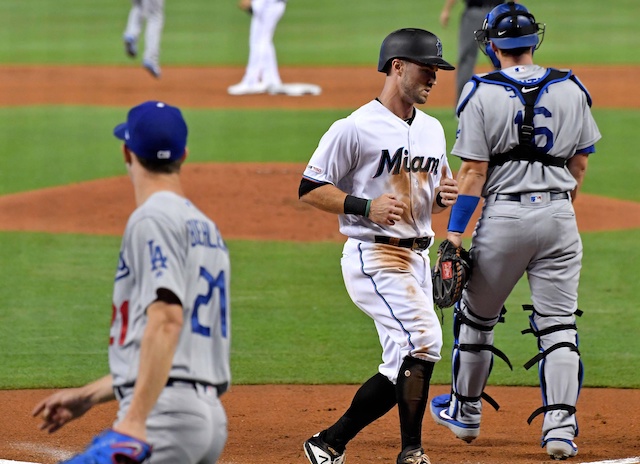Cody Bellinger set a new career high with 40 home runs and the Los Angeles Dodgers made franchise and MLB history but Walker Buehler labored through a short start and the Miami Marlins avoided a season sweep with a 13-7 victory.
Caleb Smith was hardly efficient but he completed four no-hit innings as the Marlins jumped out to a 2-0 lead. Smith benefitted from Lewis Brinson’s diving catch on a bang-bang play to not only end the fourth but prevent the Dodgers from having their first and but also scoring a run.
While it kept Smith’s bid for history alive, that was dashed shortly after as Kyle Garlick led off the fifth inning with his third home run of the season. It cut the Dodgers’ deficit in half but ultimately proved to be a moot point.
After allowing the leadoff man to reach in four of the first five innings, Buehler was knocked out of the game by Brian Anderson’s two-run double. He failed to record an out in the fifth and became the first Dodgers starter to allow more than one run or fail to reach the sixth inning since Kenta Maeda on Aug. 4.
Pedro Baez didn’t provide much relief, with his painstakingly slow tempo being compounded by a failure to retire any of the four batters faced. He exited with the Dodgers’ deficit suddenly at 6-1 and the bases loaded. JT Chargois surrendered a two-run double before getting L.A. out of the jam.
That wound up making a bit of a difference as Max Muncy lined a two-run homer to right field in the sixth inning, and two batters later Corey Seager hit his third home run in as many games. Seager’s stretch of three consecutive games with a home run set a career high.
Any momentum the Dodgers may have generated from Muncy’s and Seager’s home runs was wiped away as the Marlins responded with a five-run sixth inning. As a result, Bellinger’s three-run blast in the seventh hardly put a dent in the Dodgers’ deficit.
They nonetheless finished with 14 home runs in the three-game series. The previous franchise record of 12 was set in May 2002, when the Dodgers were carried by Shawn Green’s historic four-home run game.
L.A. additionally became the first team since at least 1908 with a minimum of four home runs in four consecutive games.






